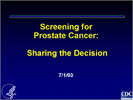|
|
||||||||||||||||
|
|
|
|
|
|||||||||||||
|
|
Control and Prevention Division of Cancer Prevention and Control 4770 Buford Hwy, NE MS K-64 Atlanta, GA 30341-3717 Call: 1 (800) CDC-INFO TTY: 1 (888) 232-6348 FAX: (770) 488-4760 E-mail: cdcinfo@cdc.gov Submit a Question Online |
|
|
|
Informed Decision Making:
|
||||||||||||||||||||||||||||||||||||||||||||||||||||||||||||
|
|
|
CDC and other federal agencies follow the prostate cancer screening guidelines set forth by the U.S. Preventive Services Task Force (USPSTF), led by the Agency for Healthcare Research and Quality (AHRQ). CDC supports the assessment of and follows the recommendation set forth by the U.S. Preventive Services Task Force.
CDC has developed a portfolio of educational materials about prostate cancer screening, which are designed to promote discussion between patients and physicians and to help men aged 50 years or older make informed decisions about prostate cancer screening. These materials include
Screening for Prostate Cancer: Sharing the Decision A slide presentation developed to provide primary care providers (i.e., physicians, nurse practitioners and physician assistants) with current information on prostate cancer screening and to encourage the use of shared decision making. Also included is a Toolkit and a Bibliography for the slide presentation.
A slide presentation developed to provide primary care providers (i.e., physicians, nurse practitioners and physician assistants) with current information on prostate cancer screening and to encourage the use of shared decision making. Also included is a Toolkit and a Bibliography for the slide presentation.
Prostate Cancer Screening: A Decision Guide for African Americans
![]() This informed decision making guide targets African-American men. At all ages, African-American men die of prostate cancer more often than other men do. The reasons for the variation among groups are unknown, making it critical that African-American men know the facts about prostate cancer and the available screening tests.
This informed decision making guide targets African-American men. At all ages, African-American men die of prostate cancer more often than other men do. The reasons for the variation among groups are unknown, making it critical that African-American men know the facts about prostate cancer and the available screening tests.
La Detección del Cáncer de Próstata: Una Guía para Hispanos en los Estados Unidos (PDF-512KB)
![]() This 24-page booklet, written in Spanish, provides basic information and encourages Hispanic men to decide whether screening is the right choice for them.
This 24-page booklet, written in Spanish, provides basic information and encourages Hispanic men to decide whether screening is the right choice for them.
Why do men choose one treatment over another?
Zeliadt SB, Ramsey SD, Penson DF, Hall IJ, Ekwueme DU, Stroud L, Lee JW. Why do men choose one treatment over another?: a review of patient decision making for localized prostate cancer. Cancer 2006;106(9):1865–1874.
Prostate-specific antigen test use reported in the 2000 National Health Interview Survey
In 2000, the National Health Interview Survey (NHIS) collected information about prostate-specific antigen (PSA) test use in a representative sample of U.S. men. This study examined PSA test use in subgroups of men, defined by personal and social characteristics. Among men aged 50 years and older with no history of prostate cancer, 56.8% reported ever having had a PSA test, 34.1% reported having had a PSA test during the previous year, and 30% reported having had three or more tests during the previous 5 years. Screening was greater among men aged 60–70 years, those with greater access to care, and those practicing other preventive behaviors.
Among men in their 40s, use tended to be higher among African-American men. The prevalence and patterns of PSA screening suggest that it is used like other cancer screening tests among about a third of U.S. men. Because of the lack of scientific consensus on whether prostate cancer screening is beneficial, more information is needed on how knowledgeable both patients and practitioners are about the potential benefits and harms of screening and how prostate cancer screening decisions are made.
Ross LE, Coates RC, Breen N, Uhler RJ, Potosky AL, Blackman D. Prostate-specific antigen test use reported in the 2000 National Health Interview Survey. Preventive Medicine 2004;38(6):732–744.
![]() Please note: Some of these publications are available for download only as *.pdf files. These files require Adobe Acrobat Reader in order to be viewed. Please review the information on downloading and using Acrobat Reader software.
Please note: Some of these publications are available for download only as *.pdf files. These files require Adobe Acrobat Reader in order to be viewed. Please review the information on downloading and using Acrobat Reader software.
|
||||||||||||
|